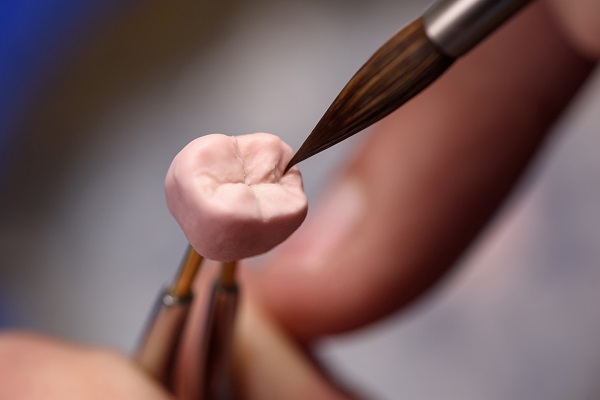Dental Crown to Restore a Damaged Tooth

A tooth with significant damage will need a dental crowns or cap. This restoration can restore the form and function of your tooth. Getting a large filling or a root canal will need a cap to protect and strengthen the tooth. If you want to know how a dentist will use a dental crown to restore your damaged dentition, here are the details.
Why dentists use dental crowns
A dentist will bond a dental crown to a tooth with a severe crack or decay. The cap will cover the exposed part of the damaged tooth above the gumline. It is a custom-fit restoration. Traditional crowns are fabricated in dental labs. This often takes weeks to finish. With the computer-aided design, a patient can get a dental crown in just one visit.
A dentist can provide a crown to prevent a tooth from more damage. The cap can support a tooth with a large filling and restore a broken tooth’s distorted shape. The dentist will cement the dental crown over the tooth. This will hold the tooth together and prevent the damage from worsening. The cap can also restore the alignment, function, appearance, and shape of the broken tooth.
A dental crown will look natural. The dentist will make sure the crown will blend with the patient’s surrounding natural teeth. Materials for making crowns are durable. This allows the crowns to take the pressures of biting and chewing.
The process of crown placement
A dentist will clean the patient’s teeth and gums first. Any dental issue will receive treatment first. Such issues are cavities and gum infection. The dentist will then anesthetize the area around the tooth. Trimming off the sides of the tooth will come next.
The dentist will rebuild the missing part of the tooth. This will make the tooth a better foundation for the crown. The dentist will take impressions of the treated tooth. The lab will use these impressions to construct the crown. It will take two weeks for the lab to make traditional caps. The patient will wear temporary crowns while waiting.
The dentist will take off the temporary crown during the next visit. Then, the dentist will place the permanent crown over the tooth. Adjustments may be necessary. This will ensure a good fit while biting, chewing, speaking, and laughing. Then, the dentist will cement the crown over the tooth.
The dentist will take a curing light and harden the cement. This will secure the dental crown over the weakened tooth. The patient will leave the dental clinic with a restored tooth. This restoration will last for a lifetime with proper care and maintenance.
Possible problems with a dental crown
A new dental crown may feel uncomfortable at first. It may even be sensitive after the anesthetic fades. A crowned tooth still has an intact nerve in it. This nerve is still capable of experiencing temperature sensitivity. Pain often indicates that the crown’s position is too high on the treated tooth.
In some cases, dental cement may wash out from underneath the crown. This means that the substance binding the crown to the tooth is disappearing. The crown will loosen, which can invite bacteria to enter the tooth and cause damage. The crown may also fall off. Deteriorating dental cement can cause this problem. Once the crown comes off, the patient must clean the tooth and replace the crown right away.
Porcelain or porcelain-fused-to-a-metal crown can chip off sometimes. Dentists can use composite resin to repair a small chip. This can happen while the patient still wears the chipped crown. Severe chipping will need a crown replacement.
Some patients experience an allergic reaction to dental crowns. The metal component in some crowns can trigger this reaction. Allergic reactions to porcelain are rare. A dark line can also appear next to the gumline of the crowned tooth. This is not appealing to look at. The dentist may need to replace the entire crown with a pure porcelain one.
A dental crown can bring back your youthful, radiant smile
Dental damage can cause you to hide your smile and try to avoid human interaction. It can also cause you pain whenever you eat, drink, or speak. Proper treatment and a dental crown can help you regain your smile and oral health. Your dentist can perform a thorough dental check to see if you are a good candidate for this treatment.
Are you considering getting a dental crown in the McLean area? Get more information at https://www.oaktreefamilydental.com.
Check out what others are saying about our dental services on Yelp: Dental Crowns in McLean, VA.
Recent Posts
A dental crown can fix a broken tooth. An accident, biting on a piece of hard food, or an intense hit to your face can cause this dental injury. You then experience pain and sensitivity, not to mention self-consciousness about the unsightly appearance of your broken tooth. It is a good thing that modern dentistry…
A dental crown can restore a damaged, worn, or weakened tooth. This restoration can bring back your healthy smile and stable dental function. Knowing the benefits of dental caps can motivate you to set an appointment soon. Here are the benefits of a dental crown that you must consider.Losing a tooth can be annoying, especially…
A dental crowns is often the best option to repair the affected area when a patient is dealing with severe tooth damage or decay. Dental crowns can also protect weak or brittle teeth, improve the patient's appearance, and correct many other dental issues. For many people, this type of treatment helps to both restore and…
Whether you need a root canal or have decay, your dentist may recommend you get a dental crown. However, you might be wondering what a dental crown is. A crown can restore the appearance and function of your natural tooth. It is a way of saving your tooth, which can be preferable to getting an…


